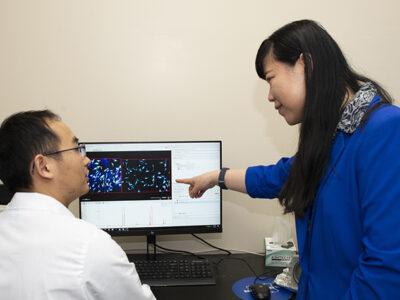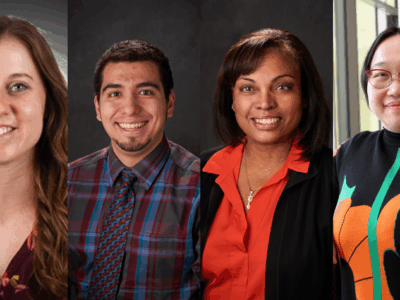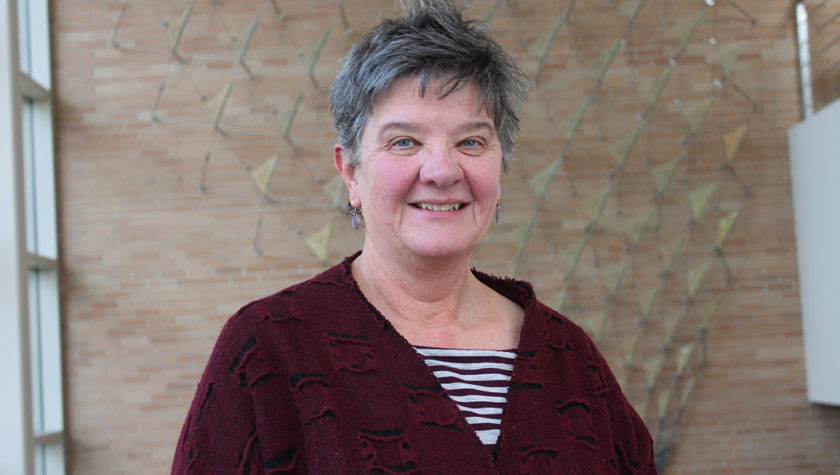
23
June

After 25 years with the School, Kraus plans another ‘repotting’
By Katie Gerhards
You might know her as the vice chair of the University of Wisconsin–Madison School of Pharmacy’s Pharmacy Practice Division, or as a professor, or director of the School’s Office of Global Health, which she helped to create.
Perhaps you know her as the chair of admissions for the School, or a member of the scholarship and experiential education committees, or as section editor for the Evidence-Based Practice journal of the Family Physicians Inquiries Network, where she’s also a senior author.
Or maybe, you just know her as Connie Kraus (BS ’75, PharmD ‘93): quilter, fisherwoman, grandmother, world traveler, and pharmacist. However you know her, you’re not likely to forget her vibrant, inquisitive spirit and passion for learning as much as teaching.
“When I think about my greatest professional accomplishments, they all came out of interprofessional teams working together to build things.”
–Connie Kraus
In July 2018, Kraus is retiring after 25 years with the UW–Madison School of Pharmacy, and 17 years with UW Hospital and Clinics before that, where she worked primarily as a pediatric pharmacist.
“People use the word ‘retire’ to mean go to sleep, but I’m not doing that—I’m rearranging,” says Kraus. “I’m not retiring as much as I’m repotting. If you’re repotting a plant, you’re giving it new soil, so it can grow better. That’s how I’m looking at retirement.”
Kraus landed at the UW–Madison School of Pharmacy after returning to earn a PharmD degree in 1990, more than a decade after she received her bachelor’s degree in pharmacy in 1975. She was in the second graduating class of the School’s new PharmD program, and, on a whim, applied for a faculty position she’d heard about from a colleague. She hadn’t intended to leave her position at UW Hospital and Clinics, but, when she was offered the position, she decided to use the opportunity to shift focus—her first “repotting.”
“Working at UW Hospital, the focus was practice and teaching. Even as a pharmacist, I would come to the School and lecture in pediatrics,” says Kraus. “I’ve always loved teaching, so that transition was really just a matter of focusing more heavily on teaching, while maintaining practice.”

Because of the close relationships she already had with faculty from being both a student and a lecturer, her first day on the job already felt like home, says Kraus. “I’ve met some pretty marvelous people in my career, and most of them will continue to be a part of my life whether I’m working with them or not.”
Through her time with the School, she’s guided six full classes of PharmD students from their first day to their graduation, helped develop two interprofessional educational programs, and traveled to four countries to establish and survey sites for pharmacy student education (some as many as six times). She’s touched the lives of students, colleagues, patients, and total strangers abroad.
“We are very fortunate to have Dr. Kraus as a pharmacy leader who has made an indelible mark on the School of Pharmacy,” says Barry Gidal, professor and chair of the School’s Pharmacy Practice Division. “She was one of the first post-baccalaureate PharmD students in the School, and she was a clinician for many years before that, so she accumulated a lot of valuable institutional and historical knowledge.
“Connie has helped shape our curriculum, as one of the first to develop a primary care focus in pharmacy education for our PharmD students, and her interests in teaching evidence-based medicine and how to communicate findings through clinical inquiries are a unique thread that she brought to our curriculum. Her contributions at the School of Pharmacy will be remembered and missed.”
Connie Kraus reflects on the special moments and successes of her career and shares a few stories in her own words.
Why I became a pharmacist
When I was preparing for college, I had two pathways I was thinking about: one was architecture, and I had a scholarship to go to UW–Milwaukee for that. The other option was pharmacy, here at UW–Madison.
I ended up choosing pharmacy because, at that time, there were more women students (30 percent) in the pharmacy program than I would have encountered in architecture. It was a different time then than now.
What I’m especially proud of

When I think about my greatest professional accomplishments, they all came out of interprofessional teams working together to build things. My colleagues in the Pediatric Pulmonary Clinic and I at UW Hospital and Clinics built the Pediatric Pulmonary Center, designed to promote interprofessional teaching of students to care for chronically ill children in a health care team setting. It opened in 1985, and it was a novel way of teaching.
When I arrived at the School of Pharmacy, I was asked to create a practice in family medicine, which is where I still practice today. Most of the clinics I’ve worked in never had pharmacists working as part of the healthcare team before. I’m grateful that I had the ability to go into a place where pharmacists hadn’t been and to work with the team to figure out how to contribute. Now, you see pharmacists in all of these areas, and it’s gratifying to see this and know I had a role in developing it.
I was also one of several faculty members asked by the deans of the health sciences schools to form a committee to create a policy to address risk management for faculty and students engaged in international work and study. Beyond the travel policy, our committee began to talk about faculty-led, interdisciplinary, international learning experiences for students, and out of that was born today’s Global Health Institute. The School of Pharmacy’s Office of Global Health was a spinoff from that, when a colleague and I created a number of fourth-year clerkship opportunities for pharmacy students in international settings.
I chose pharmacy over architecture, but I guess I still got to fulfill my desire to build things. While I don’t have a building to show for my work, I do have several interprofessional programs I have a hand in developing. Those will be the things that I think about when I think about my legacy, because they’re still all there. As I’ve walked away from them, they’re still moving and operating because they’ve become institutionalized.
The best thing about working on a team is that you don’t have to do everything yourself, and you have some pretty enjoyable moments along the way. I’m still highly connected with all of those people that I’ve built things with, and that will remain.
My first trip abroad
I was 30 when I took my first international trip to Ecuador in 1983, where my husband and I were visiting his brother in the Peace Corps. In fact, in addition to being the first international trip for both of us, it was actually our first time on an airplane. We had three kids, and we had never flown anywhere. I think it’s fitting that my very first time on an airplane was an international experience.
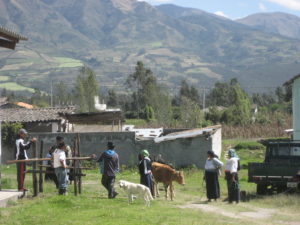
I don’t remember being nervous; I was excited, and the trip did not disappoint. We were in the jungle, we toured the country, and we spent a whole day at an archaeological dig. Our driver just happened to know about the dig, so he asked if we wanted to go. We still often say yes to opportunities like that.
It was interesting to go back to Ecuador about 30 years later to perform an educational evaluation for a program offered by International Academic Programs at UW–Madison. The country had changed in so many ways—the big cities had gotten even bigger and new businesses, like ecotourism, were being developed.
Since then, I’ve also traveled to Thailand six times, South Africa twice, Oman three times, and China to set up international fourth-year rotation sites for PharmD students. But I’ve been to more places than that because we have family and friends abroad and have also traveled for my husband’s work. These countries include: Australia, Netherlands, Greece, Portugal, Switzerland, Germany, Canada, Mexico, and El Salvador.
My favorite travels
When I went to El Salvador in 1996 with a group of my colleagues from my clinic, the country had just emerged from a civil war a few years before, in 1992. It was fascinating to talk to people in this rural setting about what it was like during the war and the steps they were taking to rebuild their community.
One evening several women from the village and from our delegation were sitting around a campfire. The evenings got surprising cool and the campfire felt good. After I introduced myself, one of the women asked me my thoughts about the importance of education for children, in general, and for girls, specifically. I shared with them my own experience as a first generation college student and how receiving a good education had enabled me to do many things. I went on to say that I had encouraged my daughters to also pursue their educations to expand their opportunities.
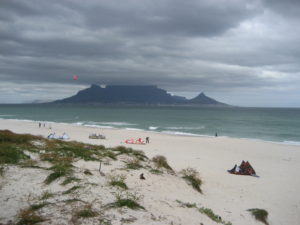
In South Africa, there were pictures I saw and conversations I had that gave me a better sense of the evolution of civil rights in that country and, as someone who grew up during the Civil Rights Movement, made me reflect on the continuing evolution of civil rights in our country. My time in South Africa also reinforced my appreciation for the role that higher education plays in supporting change and growth of communities and countries.
There’s something about everywhere I’ve gone that I’ve found interesting. I like to talk to people, and I love to learn.
I’ve traveled a lot, but I’ve never really been a tourist, and I think that’s the richness of traveling for work or visiting family. I talk to people who live there and have them show me where locals hang out. I have more emotional connections to places because of the people I meet, like the conversation I had with an older gentleman in a brown café while traveling through the Netherlands. He invited me visit a local pottery shop where he knew the owner and we entered through the back door, where I got to sit down next to someone who was hand-painting the famous “Delft Blue” dishes, giving me the insider’s view. Those are the type of travel experiences I’m used to.
The best advice I’ve learned
One thing I’ve learned from international experiences is that it is not possible to become culturally competent in somebody else’s world, but it is possible to exercise cultural humility, which means taking a step backward and examining our own biases and beliefs before going into somebody else’s world. I’ve learned to temper drawing quick conclusions, and choose to listen and learn first. It’s very easy to fall into a we/them mindset. Looking for the shared experiences or “common ground” as a starting point for first discovering how our experiences are similar should always occur before exploring the differences.
And you don’t have to travel to practice that mindset. You can get on the bus in Madison and experience people from walks and ways of life that might be very different from your own.
What I’ll do next
In the words of the Beatles, ‘Life goes on within you and without you.’ I have always found these words to be reassuring, giving permission to live and not feel concerned about moving on because in those places where we’re leaving, life will continue as well.
“We are very fortunate to have Dr. Kraus as a pharmacy leader who has made an indelible mark on the School of Pharmacy.” –Barry Gidal
I will likely stay connected to pharmacy in some way. I’m not sure what that will look like yet, but it will come to me. But everyone is more than their job—I’m a wife, I’m a mother of three and a grandmother of seven. I’m a quilter, I love to fish, and I enjoy writing short stories about my experiences, so I’d like to spend some time doing those things. I’m writing for my grandkids. I’d like to give them a history of what I have discovered about our family, because I’ve put time into researching it.
I’ve also seen things in my travels, whether personal or professional, where I’ve learned a lot, and those are lessons that shouldn’t be wasted on me. Maybe that’s the eternal teacher part of me.
I haven’t quite figured out what I want to do in the next chapter of my life, but some of the best parties I’ve ever been to are the ones that spontaneously erupt, so I’m fine not knowing.
Learn more about the international experiences Kraus helped build.


